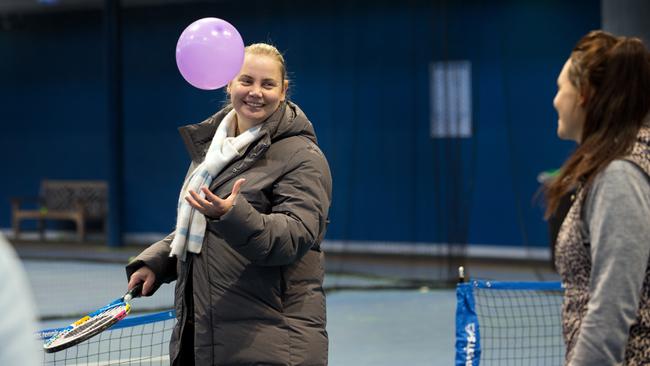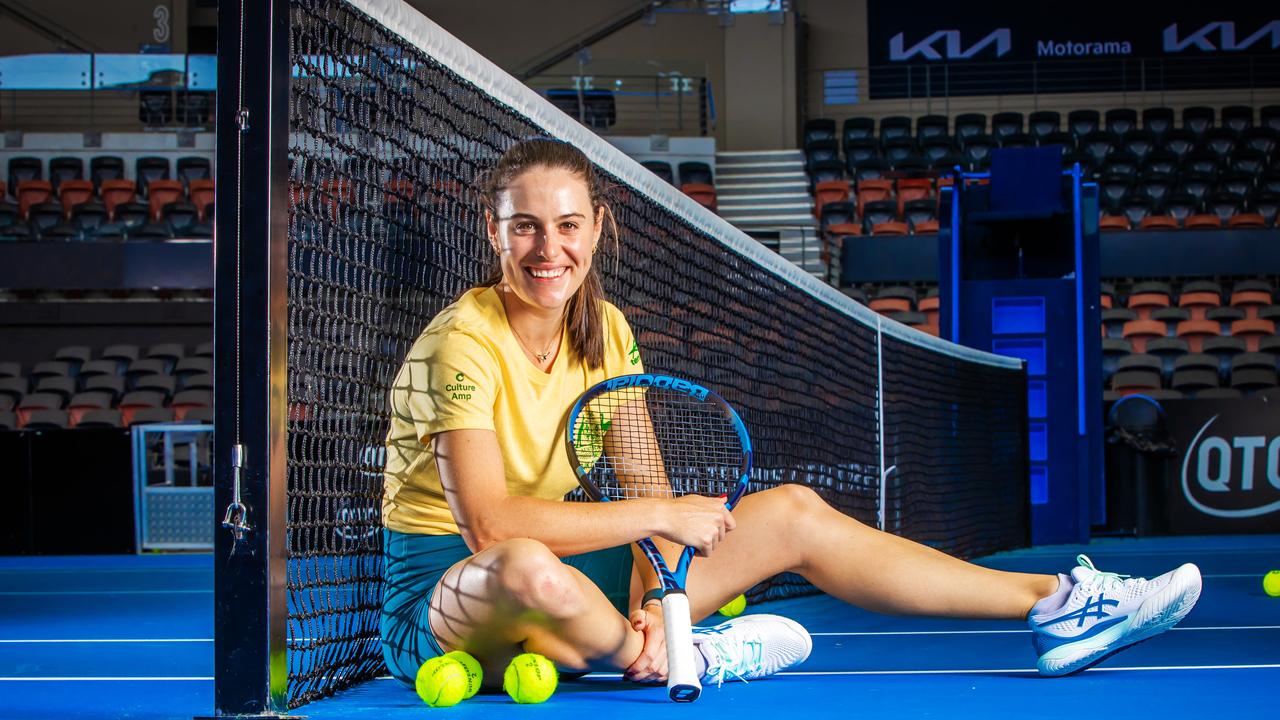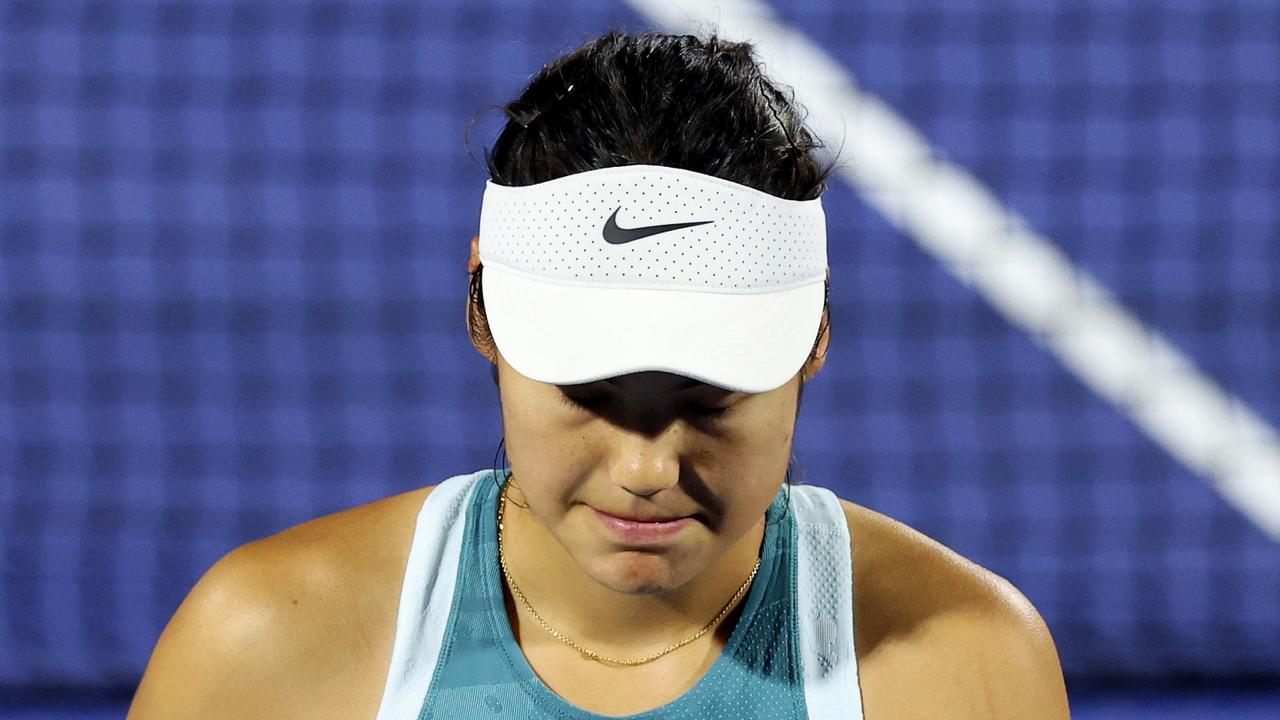Casey Dellacqua and Sam Groth learning the art of coaching kids
Some of Australia’s top players have been learning the dark arts of coaching kids.

As one of the world’s finest doubles players over the past decade, Casey Dellacqua was more than adept at putting away a volley.
But a year after partnering Ash Barty to success in the Aegon Classic in Birmingham, the left-hander was learning how to do it all again at Melbourne Park on Thursday.
The sight of Dellacqua batting balloons back and forth with Jelena Dokic, a semi-finalist at Wimbledon at the start of the century, rather than blasting balls with precision and power, prompted a sense of incredulity.
So, too, watching Newcombe medallist Sam Groth bouncing up and down while pretending to be a bunny rabbit, or Davis Cup representative Chris Guccione miming the action of catching tennis balls with a fish strainer.
But there is method to the madness that had grand slam finalists and competitors with wins over the world’s best players acting like circus performers.
In different stages of retirement from the tour, the quartet have joined a squad of past and present professionals completing a junior development course at the National Tennis Centre.
“This is something completely out of my comfort zone, diddling with balloons and standing on coloured cones and talking to ages three through 12,” Groth told The Weekend Australian.
“It is not something I have really dabbled in, even when I had my break and did some coaching.”
Groth doubts he will coach again on more than a consultancy basis but believes undergoing this tuition can be beneficial when trying to explain the sport in his various media roles.
Andrea Buckridge, Tennis Australia’s manager of education and professional learning, said there are several reasons the national body has invited the former stars to participate.
From a practical sense, should TA want to use Dellacqua or the others as mentors or as a captain for a junior Fed Cup team, for example, an internationally recognised coaching certificate is required despite their status as players.
But they believe the course, aimed at coaching kids at Hot Shots levels, will also assist athletes like Groth in other areas in which they might want to specialise, even if they do not wish to go into coaching on a fulltime basis.
“We want these past players to stay in our sport, because they have so much knowledge. They have done the work to know the work,” Buckridge said.
Dellacqua has been busy since announcing her retirement after partnering Barty to a crucial win in a Fed Cup tie in Canberra in February. A recent appearance on SBS to discuss the impact concussion had on her career made for compelling viewing. Although the adrenaline began to pump during the French Open a few weeks ago — she and Barty made the final last year — Dellacqua has no real regrets and plans to play touch footy to satisfy the urges to compete.
“I know I have made the right decision. I made the decision when I was in the top 10 in the world and it was on my terms and for certain reasons, which were important to me, so I am really happy,” she said.
“The grand slams are always more special and those competitive juices got going, but in saying that, I would think about the time of travel and being away, even being at home and having to get to practice, and that was the stuff for me that I just didn’t really want to do any more.”
Dellacqua plans to remain involved in tennis, even if that extends simply to taking her children Blake and Andie down to the local courts in Sydney for a hit, or becoming more involved with elite juniors.
“I actually think personally that I will learn more from this stuff than the high performance course,” she said. “I feel like that has become second nature to me. But this stuff is really interesting. Obviously having young kids, a lot of it is about developing them and hopefully getting them into tennis, which I am really interested in.”
Dokic, who was responsible for one of Wimbledon’s greatest upsets when she thrashed defending champion Martina Hingis in the opening round in 1999, will commentate on this year’s tournament for the Seven Network.
She has been busy with media obligations and keynote speaking engagements related to her best-selling autobiography Unbreakable, but also returned to the court recently.
“I want to learn still,” Dokic said. “Even though we were tennis players, it is different. It is a very different role being a tennis coach or helping others, so I wanted to advance my skills and communication and learn and at the end of the day, be certified and have that credential.”
Guccione, who holds a protected doubles ranking of 40 and could yet make sporadic tour appearances, has been coaching fulltime with his brother Anthony at the Greenvale Tennis Club over the past 18 months.
“For all of us, we have all done a lot of things, be it in pro-ams or clinics when we are away, but that is either working with adults or more the advanced kinds of kids. But coming back and teaching five-year-olds is a different story,” Guccione said. “That is probably the biggest learning curve, learning how to deal with the kids.”




